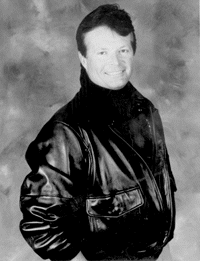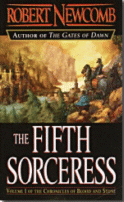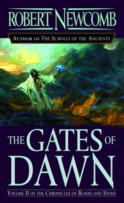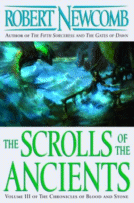A Conversation With Robert Newcomb
by Claire E. White
Being a bestselling fantasy author is actually Robert Newcomb's second successful career.

|
His wife had recently read a Terry Goodkind book while on vacation, and she suggested that Rob read it. Having never been a reader of fantasy, he was somewhat reluctant, but started reading. He was immediately hooked. His wife then dared him to take a crack at a lifelong dream of his: writing a novel. So he took the plunge, sat down at his laptop computer and started writing a fantasy novel which was to become The Fifth Sorceress (Del Rey). He found an agent, and the manuscript quickly started a bidding war between major New York houses. The manuscript was eventually sold to Random House as a three book deal, in the largest fantasy contract awarded to a first-time author in the U.S.
The Fifth Sorceress, the first book in The Chronicles of Blood and Stone saga, was published in June, 2002. The Gates of Dawn was published June 2003 and The Scrolls of the Ancients, the third book in the series, is being released in June, 2004. The series is epic in scope. Set in the land of Eutracia, Prince Tristan and his twin sister Shailiha, who are the Chosen Ones of prophecy, face terrible enemies who attempt to destroy their world. Born with endowed blood, Tristan and Shailiha have the inherent ability to wield magic, but only after intense training which they did not have before they were viciously attacked by the five Sorceresses. The fantasy world is rich in depth and complexity and the sorceresses in the first book are some of the most disturbing and most interesting villains to come along in a long time in fantasy fiction. The response to the first three books has been phenomenal; Del Rey has just signed on for three more books in the series.
Rob and his wife Joyce, a practicing neuropsychologist and novelist, make their home in southern Florida. When he isn't writing, he enjoys weightlifting, Shotokan Karate, and going to the beach to do absolutely nothing. Rob spoke to us about his move from the auto business to being a bestselling author, and how he created his epic fantasy series. He also addresses the controversy that swirled around The Fifth Sorceress and his decision to make the worst villain a woman.
When you were a little boy, what did you want to be when you grew up? Was author one of the professions you dreamed about?
When I was a kid, my first choice was to become a doctor. As I grew older and went to college, I had plans to go to law school. But the family businesses beckoned, and frankly, they seemed too good to shy away from. In those days writing was never the plan. I had my favorite authors, and like most kids I toyed with the idea of writing a book one day. But by the time one gains the maturity to do a good job of it, it seems that real life has raised its ugly head and other matters become the priority. And so, my writing career seemed destined to wait a while.
Did you do any writing when you were in school or when you were growing up? Was there anyone who encouraged you in creative pursuits?
I did do some writing in high school, but none in college. Like most of us, I was too busy trying to get decent grades, I suppose. But when I was younger I was lucky to be encouraged in creative pursuits. My mother was a music teacher and my grandmother was a remedial reading teacher. They both encouraged me, and for that I'll always be thankful.
I'd like to talk about the first book in this series, The Fifth Sorceress. How did this book come into being? What prompted you to finally sit down in a chair and start writing?

|
How did you approach building the world which is the setting for this series? What was the greatest challenge in creating this world?
It is my belief that the plot must fit the world -- not the other way around. If the author tries to mold the world to fit the plot, he or she will invariably end up with a square peg in a round hole -- it will seem forced and contrived, and that's the death knell for a good story. I didn't really understand that when I started, but as the saga took shape it quickly became obvious. The greatest challenge was creating a magic system that sprung from a rational, believable source, and that would continue to be revealed as the books went along. With each successive volume it shall be my intention to reveal just a bit more of how the magic really works, and how it affects the characters I have created. It will be a puzzle that they will all solve together, taking the reader along with them as they go.
The sorceress Succiu is a fantastic villain: she's unbelievably cruel, sadistic, brilliant, totally focused on her own goals to the exclusion of any other considerations and perhaps a bit mad. How did you create Succiu? What was the greatest challenge in creating her?
Succiu was indeed fun to bring to life. I wanted a villainess who was at same time beautiful and deadly, yet also a bit warped. She isn't afraid to contradict Failee from time to time, either. The greatest challenge in creating her was to make her extreme behavior seem almost normal -- at least in her mind. What some might call the over-the-top behavior of the sorceresses had to have a substantial reason backing it up. This was accomplished by making them all mad as a result of their improper uses of the Vagaries -- especially in Failee's case. It is also important to convey the idea that villains and villainesses don't really know that they're bad. As more of the biological aspects of endowed blood are revealed, this concept will take on greater importance. My readers will learn that all practitioners of the craft are as much compelled toward their behavior by the nature of their blood as they are by their free will. In effect, without evil, there can be no good.
The book was controversial with some fans and critics about the fact that the villains were all women, in fact some people even claimed that you were misogynistic. What's your answer to those people?
| "It is my belief that the plot must fit the world -- not the other way around. If the author tries to mold the world to fit the plot, he or she will invariably end up with a square peg in a round hole -- it will seem forced and contrived, and that's the death knell for a good story." |
The hero of the story is Tristan, the young prince who could literally be described as a blueblood, (and I'm not just talking about his royal lineage). How did you create the character of Tristan? Were there any traits you were particularly trying to avoid with him?
Rather than writing a book about some commoner who learns he has special gifts, immediately finds the love of his life, inherits a kingdom, and then lives happily ever after, I wanted a character that was already royalty, but didn't care much for his lofty station. Then he would lose it all, only to later appreciate it only after it was gone. I wanted women to be drawn to him, but for him to struggle with his romantic relationships nonetheless. I wanted Tristan to be a bit of a rebel, but not so much that he becomes unlikable. And above all I wanted him to be confused about the destiny into which he was so suddenly thrust by way of the return of the Coven, and the deaths of nearly all of the members of the Directorate. He had to grow up quickly, and he's still learning. He and his sister Shailiha will be doing so for a long time to come.
The wizards, Wigg and Faegan, are complex characters who continually surprise us, for example, we find out that Wigg has a surprisingly active love life for an ancient wizard. What was your inspiration for these two interesting characters?
I wanted a pair of wizards who were fallible -- and at first, slightly distrustful of one another. It was important to me that they make mistakes, because they too are still learning about the craft. All in all, I would have to say that Wigg and Faegan's combined knowledge of the craft still only amounts to about 30% of all that shall eventually be revealed. But with two such crotchety old wizards in the mix, I knew I would have to take pains to make them different. So Wigg is stern, while Faegan is mischievous. Wigg is ambulatory; Faegan is crippled. And although Faegan is the current undisputed master of the craft, it is Wigg who best knows the many secrets of Eutracia and her checkered history.
Your magical framework was fascinating and, to me, very logical. Basically, either you inherited the ability to do magic or you didn't, much as we either inherit a genius IQ, the ability to be a world class athlete or we don't. What went into your decision to set up the characters' magical abilities in this way, as opposed to magic being something that anyone could learn or use?
I wanted the ability to learn the craft to have both a biological and a mystical component that were inexorably linked. One needs endowed blood to learn the craft, and it is passed from generation to generation. This also allows for the learning of the craft to cut across both genders, and all of the various socio-economic classes of Eutracian culture. From that basic premise soon came the concepts of full and partial blood signatures, forestallments, blood quality assaying, blood signature lean, etc. If all persons could both learn and use the craft, then it would cease to be special, wouldn't it?
The magical system of the Vagaries and the Vigors is quite complex, and very intriguing. The system seems to have an almost mathematical symmetry about it. What are your thoughts on this subject? And will we eventually find out all the mysteries surrounding the workings of the system?

|
Although the characters face terrible situations -- and even torture, in some cases -- and some of the plot twists have a horror element to them, the tone of the books overall is uplifting and optimistic. Do you consider yourself an optimist? What methods have you used to get you over the difficult times in life?
Yes, my books are graphic. From the very beginning, I wanted them that way. The story I am telling can be very brutal, and I want the readers emotionally involved. But I also try to balance the darkness with beauty -- such as with the Fliers of the Fields, the Caves of the Paragon, the various chambers of the Redoubt, etc. Good triumphs, but it has to go through hell to do so. Those who practice the Vagaries mean to see it rule the world, and they will do anything to make that happen. I guess the various challenges in my life have been overcome in largely the same way as my characters have done -- with lots of perseverance, and some luck thrown in for good measure.
What is the greatest challenge you faced in writing The Scrolls of the Ancients, the third book in the series? What is the greatest challenge in writing this series?
The greatest challenge in writing Scrolls was that in this volume I had such a big story to tell. I wanted the reader to become acquainted with partial blood signatures, and herbmastery and blaze-gazing -- not to mention the significance of the Isle of Sanctuary and the Fortress of the Citadel. Each of these "new" locales has a significant place in the history of the craft, and their stories will be more fully revealed as the books go along. I also wanted to make this book nautical, with sea battles, pirates, etc, and that was a bit of a challenge in itself.
Tristan's love interest is Celeste, a beautiful and intelligent woman who has endured horrific circumstances for a very long time. How do you approach writing love scenes? Are they easier or harder for you to write than an action sequence?

|
I understand that when you sat down to write The Fifth Sorceress you didn't even know how to turn on a computer. Now you have an extensive website, your own people to run a message board. How do you feel about the Internet now? Can you live without it? Have you become a technophile? Have you succumbed to the lure of owning lots of tech devices: laptops, PDA's, cell phones etc.?
I have certainly not become a technophile, nor do I own many such devices. I know my way around a computer, but to this day my typing remains atrocious! I think that the internet is a wonderful advancement. The sharing of useful information on such a grand, worldwide scale is truly mind-boggling. But like other brilliant technological breakthroughs, it easily lends itself to some serious crazies -- not to mention unscrupulous business practices. To this day I still know people who think that simply because something appears on the Internet, it must therefore be true. That's scary, to say the least.
I'd like to talk about the actual process of writing. Would you walk us through a typical writing day for you?
I sit down to begin writing between 10:00 and 11:00 AM, Monday through Friday. I normally work for about four hours, then quit. That usually produces five or six pages a day; or 100-120 pages per month. During the evenings my wife critiques the current day's work. Saturdays and Sundays are typically used to plan the next week's upcoming scenes.
Do you outline before you begin your books, or did you let the story evolve on its own? Whether you outline, or not, does the story end up the way you planned?
I don't use an outline -- I find them to be too unforgiving. I know where the story is going, and I just write it. In each case the result has ended up the way I planned. Or in some cases it may have actually turned out better, I think, because I was free to chase various new ideas as they came along. That's where the real fun comes into play. For me, the not knowing is better than the knowing.
I'd like to talk about the editing process. How much input does your editor have on your work? Do you let anyone else, such as your wife, read your work in progress?
My editor has a huge role in the process. She line edits my work, and in so doing she always comes up with an entire host of questions about the characters, the magic, etc. She then sends the questions to me, and I answer them directly in the manuscript. The only other folks who read the raw manuscripts are other family members, and the fellow who is the webmaster for my official site.
How did you get interested in the martial arts? What do you enjoy most about practicing karate?
| "I find it interesting that for centuries, untold stories have been written and told about evil men; and as far as I know, there has never been any backlash over that. But when a story comes along in which the baddies are women, for some untold reason that just isn't acceptable. I didn't write The Fifth Sorceress to be sexist or to be controversial, or to espouse some anti-politically correct viewpoint. It just happened to be the particular story I wanted to tell to get the saga rolling. You might also find it interesting to learn that the vast majority of my readers and fans are women." |
How has the car business changed since you first took over your family business?
The auto business has certainly become more complex, and competition is fiercer than ever. Added to that is the fact that it is such a capital intensive business to run. In recent years leasing has become more and more popular, adding to the confusion that many customers already face when buying a car or truck. And the vehicles themselves have become far more complex, and more difficult to repair. All in all, I don't miss it!
With rising gas prices and environmental concerns, do you believe that hybrid cars are the future of the auto industry? Or will there be some other fuel source for cars?
Hybrids may eventually be the answer, but as of right now they have a long way to go before they can make a claim of general acceptance. Their small size and relative lack of power just don't make them practical enough for the average family. Have you ever watched a six-foot guy trying to squeeze himself in a hybrid car? It isn't pretty. If the auto engineers can ever adapt the hybrid concept into effective power plants for use in SUV's and larger cars and trucks, then we'll have something.
Can you give us a sneak peek into the next book, Savage Messiah?
It's difficult to talk very much about Savage Messiah without also saying too much about The Scrolls of the Ancients, because the two stories are so closely linked. For now, suffice it so say that some more major aspects of the magic system will come to light, and the Heretics of the Guild will begin to take a more active role in what is happening on earth. New characters will emerge, and some characters who you might have thought the saga couldn't do without shall die. All in all, I think you'll find it to be an exciting read.
Return to the June 2004 issue of The IWJ.
More from Writers Write
